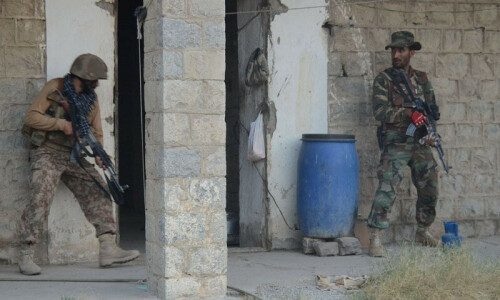
ISLAMABAD: The Foreign Office rejected on Friday allegations that Islamabad supported Taliban and the Haqqani network, as the foreign secretary prepared for a visit to Kabul amidst renewed accusations by Afghan President Ashraf Ghani that Taliban were headquartered in Pakistan.
“We reject any allegations of support to the Haqqani network or the Taliban and of them using our soil. Pakistan has been taking action against all terrorist groups in its territory. It is our commitment to eradicate terrorism in all its forms and manifestations,” said FO spokesman Dr Muhammad Faisal at the weekly media briefing.
The spokesman’s remarks coincided with President Ghani’s televised speech in which he claimed: “Pakistan is the headquarters of the Taliban. The time has come for them now to take action.”
Afghan president claims Taliban are headquartered in Pakistan
There has been little change in Kabul’s acrimonious tone towards Pakistan despite its Interior Minister Wais Ahmad Barmak and National Directorate of Security (NDS) chief Masoom Stanekzai’s visit to Islamabad during which both sides agreed to cooperate in the investigation of the latest attacks in Kabul, a couple of which were claimed by the Taliban. About 140 people were killed in the three attacks.
The Afghan president said the Pakistan government had been provided with lists of individuals and networks involved in the attacks in anticipation that the country would take “clear and specific actions” instead of “mere commitments”. The FO spokesman said Pakistan was keen to assist the Afghan government in efforts against terrorism and recalled the handover of 27 suspected Taliban and Haqqani network fighters to the Afghan government in November 2017. He said the militants were handed over to Kabul to indicate Pakistan’s sincerity in cooperation and collaboration with Afghanistan against terrorism.
“The Afghan representatives have shared information with us during the recent visit [of interior minister and NDS chief]. We will look into it and revert soon,” he said and added that Pakistan was maintaining pressure on Taliban and the Haqqani network to prevent them from using Pakistani soil against Afghanistan.
He advised the Afghan government to look inwards and fix the problems present within its territory, instead of blaming Pakistan.
“All international reports, including those from the United States, have indicated that vast swathes of territory in Afghanistan are being used by a number of terrorist groups like Daesh [militant Islamic State group], TTP [Tehreek-i-Taliban Pakistan], JuA [Jamaat-ul-Ahrar] as sanctuary. Blaming Pakistan for security lapses inside Afghanistan is unfair, especially when such large spaces and support to these elements is available within the country,” Dr Faisal said while alluding to reports by the US Special Inspector General for Afghanistan Reconstruction and Pentagon which stated that the Afghan government controlled or had some influence over 56 per cent of the country’s territory, whereas the rest was controlled or influenced by the terrorist outfits.
The spokesman noted that the Afghan security delegation’s visit led to an understanding on strengthening bilateral engagement and counterterrorism cooperation.
Foreign Secretary Tehmina Janjua would travel on Saturday (today) to Kabul for the inaugural meeting of the working groups established under the Afghanistan-Pakistan Action Plan for Solidarity (APAPS).
“The first meeting of bilateral working groups, on Pakistan’s proposal, is being held in Kabul on 3 February 2018. The Foreign Secretary will lead the Pakistan delegation,” he said.
It should be recalled that during a visit by Army Chief Gen Qamar Bajwa to Kabul on Oct 1, 2017, Pakistan and Afghanistan had agreed on having comprehensive bilateral engagement agenda.
Later Pakistan shared with Afghanistan a blueprint for engagement called APAPS, envisioning constructive and meaningful bilateral engagement in political, economic, military and intelligence domains through working groups.
China had encouraged Pakistan and Afghanistan to formalise the arrangement.
“Our proposal is for formulation of five working groups for ensuring comprehensive engagement in the areas of counterterrorism, intelligence sharing, military, economy, trade and transit interaction, refugees’ repatriation and connectivity,” Dr Faisal said.
Published in Dawn, February 3rd, 2018














































Dear visitor, the comments section is undergoing an overhaul and will return soon.